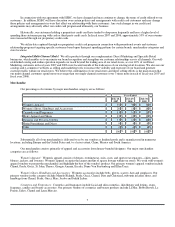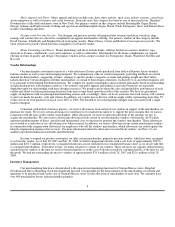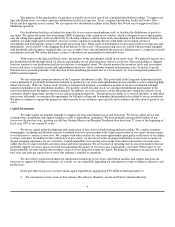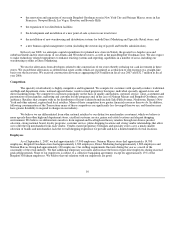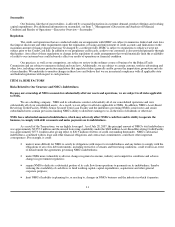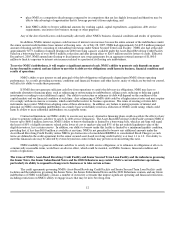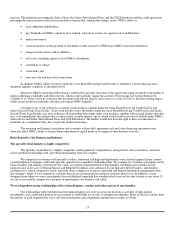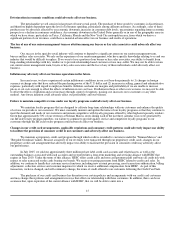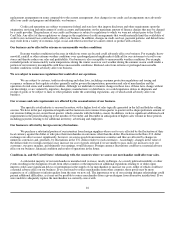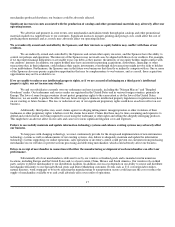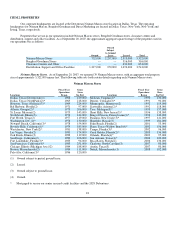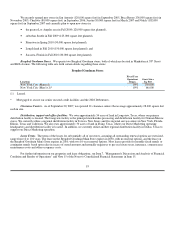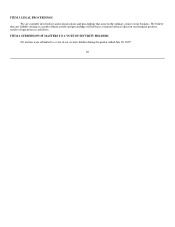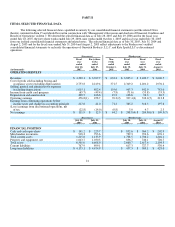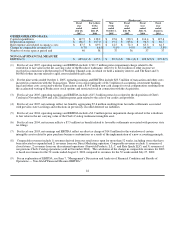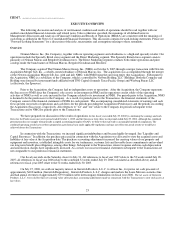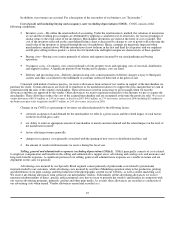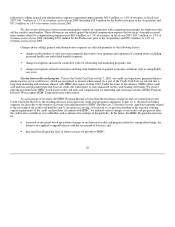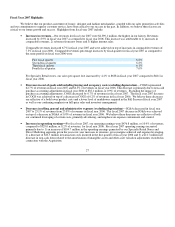Neiman Marcus 2006 Annual Report Download - page 20
Download and view the complete annual report
Please find page 20 of the 2006 Neiman Marcus annual report below. You can navigate through the pages in the report by either clicking on the pages listed below, or by using the keyword search tool below to find specific information within the annual report.
merchandise produced elsewhere, our business could be adversely affected.
Significant increases in costs associated with the production of catalogs and other promotional materials may adversely affect our
operating income.
We advertise and promote in-store events, new merchandise and fashion trends through print catalogs and other promotional
materials mailed on a targeted basis to our customers. Significant increases in paper, printing and postage costs could affect the cost of
producing these materials and as a result, may adversely affect our operating income.
We are indirectly owned and controlled by the Sponsors, and their interests as equity holders may conflict with those of our
creditors.
We are indirectly owned and controlled by the Sponsors and certain other equity investors, and the Sponsors have the ability to
control our policies and operations. The interests of the Sponsors may not in all cases be aligned with those of our creditors. For example,
if we encounter financial difficulties or are unable to pay our debts as they mature, the interests of our equity holders might conflict with
our creditors' interests. In addition, our equity holders may have an interest in pursuing acquisitions, divestitures, financings or other
transactions that, in their judgment, could enhance their equity investments, even though such transactions might involve risks to holders
of our indebtedness. Furthermore, the Sponsors may in the future own businesses that directly or indirectly compete with us. One or more
of the Sponsors also may pursue acquisition opportunities that may be complementary to our business, and as a result, those acquisition
opportunities may not be available to us.
If we are unable to enforce our intellectual property rights, or if we are accused of infringing on a third party's intellectual
property rights, our net income may decline.
We and our subsidiaries currently own our tradenames and service marks, including the "Neiman Marcus" and "Bergdorf
Goodman" marks. Our tradenames and service marks are registered in the United States and in various foreign countries, primarily in
Europe. The laws of some foreign countries do not protect proprietary rights to the same extent as do the laws of the United States.
Moreover, we are unable to predict the effect that any future foreign or domestic intellectual property legislation or regulation may have
on our existing or future business. The loss or reduction of any of our significant proprietary rights could have an adverse effect on our
business.
Additionally, third parties may assert claims against us alleging infringement, misappropriation or other violations of their
tradename or other proprietary rights, whether or not the claims have merit. Claims like these may be time consuming and expensive to
defend and could result in our being required to cease using the tradename or other rights and selling the allegedly infringing products.
This might have an adverse affect on our sales and cause us to incur significant litigation costs and expenses.
Failure to successfully maintain and update information technology systems and enhance existing systems may adversely affect
our business.
To keep pace with changing technology, we must continuously provide for the design and implementation of new information
technology systems as well as enhancements of our existing systems. Any failure to adequately maintain and update the information
technology systems supporting our online operations, sales operations or inventory control could prevent our customers from purchasing
merchandise on our websites or prevent us from processing and delivering merchandise, which could adversely affect our business.
Delays in receipt of merchandise in connection with either the manufacturing or shipment of such merchandise can affect our
performance.
Substantially all of our merchandise is delivered to us by our vendors as finished goods and is manufactured in numerous
locations, including Europe and the United States and, to a lesser extent, China, Mexico and South America. Our vendors rely on third
party carriers to deliver merchandise to our distribution facilities. In addition, our success depends on our ability to source and distribute
merchandise efficiently to our Specialty Retail stores and Direct Marketing customers. Events such as U.S. or foreign labor strikes,
natural disasters, work stoppages or boycotts affecting the manufacturing or transportation sectors could increase the cost or reduce the
supply of merchandise available to us and could adversely affect our results of operations.
17


